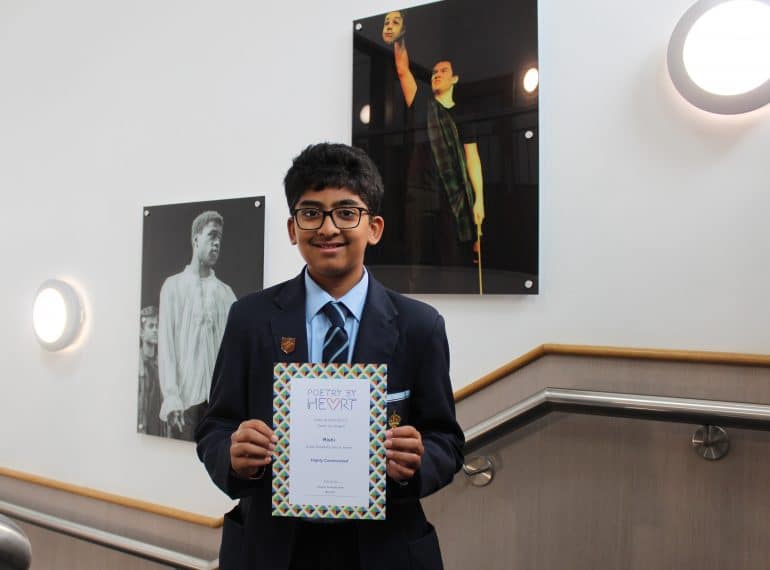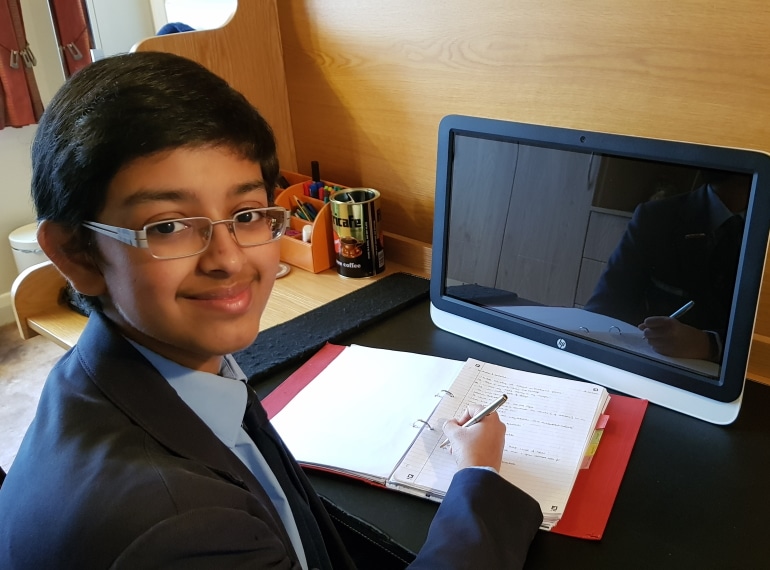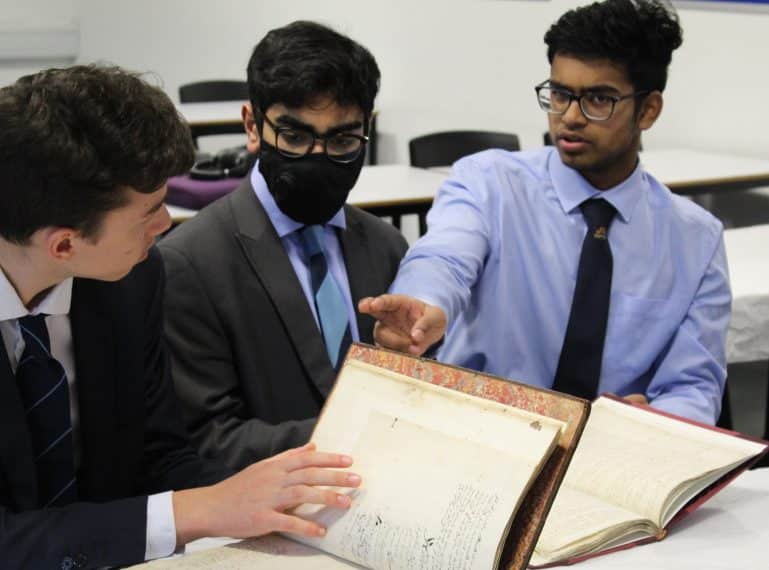
A new School society – believed to be the first of its kind in the country – is working hard to decipher QE’s earliest written records.
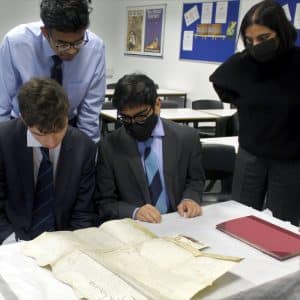 English teacher Kanak Shah has brought together a group of dedicated Year 12 boys and trained them in palaeography – the study of ancient and pre-modern manuscripts.
English teacher Kanak Shah has brought together a group of dedicated Year 12 boys and trained them in palaeography – the study of ancient and pre-modern manuscripts.
Now they have started transcribing QE Governors’ meeting minutes, starting with Volume I, which begins in 1587, and also researching the School Charter, which dates back to the School’s founding year, 1573.
Ms Shah, who has an MPhil degree in Renaissance Literature from Cambridge, said: “Due to its complexity, palaeography is usually only studied at Master’s level. But since I myself have a keen interest in palaeography, manuscripts and the early modern period, and since QE boasts one of the most robust school archive collections in the UK, I was eager for the students to be involved in preserving and curating their own School’s history.”
Working together with Ms Shah and Jenni Blackford, Curator of QE Collections and Head of Library Services, are the following Year 12 A-level History students: Gabriel Gulliford, Ishaan Mehta, Muhammad Nayel Huda, Kai Mukherjee, Danny Adey, Conall Walker and Jeeve Singh. All are currently studying the early modern period and are considering pursuing courses in subjects such as History, Palaeography or Archaeology at university.
“We started by following Cambridge University’s English Handwriting 1500-1700 online course to develop the students’ transcription skills. We then began to transcribe the digitised manuscripts on QE Collections [the School’s publicly available digital archive, launched last year].
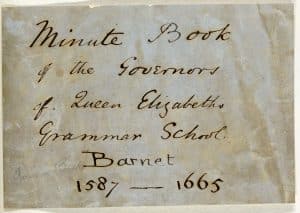 “The earliest documents present an interesting challenge as they were written before the standardisation of handwriting, and so require careful decoding,” said Ms Shah.
“The earliest documents present an interesting challenge as they were written before the standardisation of handwriting, and so require careful decoding,” said Ms Shah.
Having initially familiarised themselves with the subject matter digitally, the group are now working with the original archive materials, guided by Mrs Blackford.
They plan to publish the transcripts on QE Collections in the Summer Term, while they will contribute their research to an exhibition of archival material planned for the School’s 450th anniversary next year.
“Looking forward to the future, we would be keen to establish a working relationship with Barnet Museum, who possess a complete transcription of these Governor’s minutes that was done many years ago,” said Ms Shah.
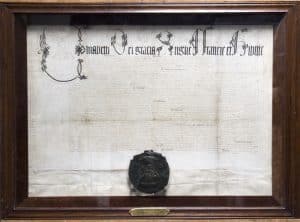 It is not clear who made the the Barnet Museum transcription, which was completed some time prior to 1931. The preface to the museum’s collection of QE translations and transcriptions was written in May 1931 by Cecil L Tripp, author of A History of Queen Elizabeth’s Grammar School, published 1935.
It is not clear who made the the Barnet Museum transcription, which was completed some time prior to 1931. The preface to the museum’s collection of QE translations and transcriptions was written in May 1931 by Cecil L Tripp, author of A History of Queen Elizabeth’s Grammar School, published 1935.
“Transcriptions are often erroneous and subjective, so it is very interesting for the boys to compare their own work with the museum’s transcription, and to contribute to Barnet’s history in such an active way.”
Once the pupils’ transcription has been completed and it and the Barnet Museum transcription have been digitised, they will both be published on QE Collections.

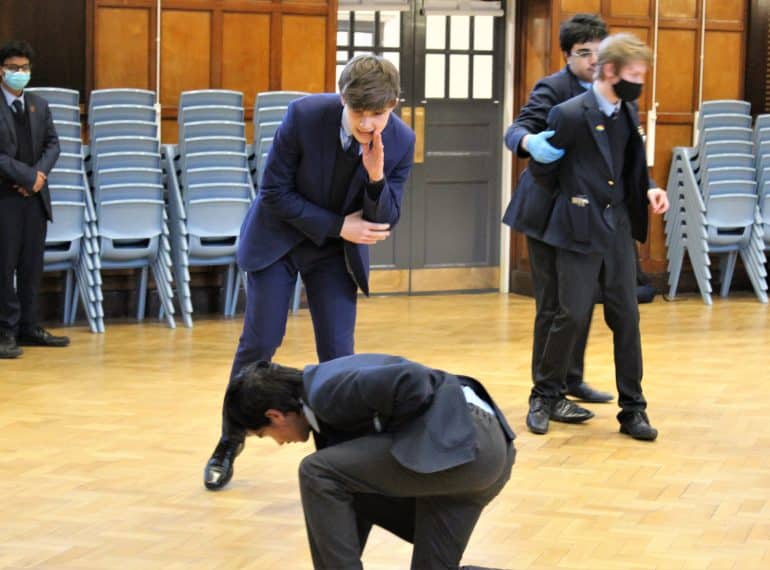
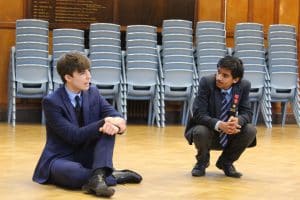 The production will also form part of QE’s homegrown Shakespeare festival, along with a diverse programme of other activities, ranging from an academic lecture to an inter-House competition.
The production will also form part of QE’s homegrown Shakespeare festival, along with a diverse programme of other activities, ranging from an academic lecture to an inter-House competition.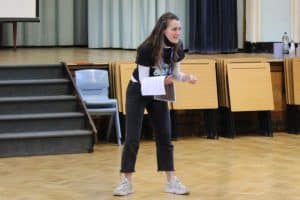 The play tells the story of an African general, Othello, in the 16th-century Venetian army who is tricked into suspecting his wife of adultery. Sexual jealousy and racial prejudice are among its leading motifs. In it, the sinister standard-bearer, Iago, manipulates Othello into a jealous rage, but all the while appears to warn his commander against the destructive emotion: “O beware, my lord, of jealousy; It is the green-eyed monster which doth mock the meat it feeds on” – the first coinage of the term “green-eyed monster”. Other quotations from the play that have become the stuff of everyday speech include: “‘T’is neither here nor there” and “I will wear my heart upon my sleeve”.
The play tells the story of an African general, Othello, in the 16th-century Venetian army who is tricked into suspecting his wife of adultery. Sexual jealousy and racial prejudice are among its leading motifs. In it, the sinister standard-bearer, Iago, manipulates Othello into a jealous rage, but all the while appears to warn his commander against the destructive emotion: “O beware, my lord, of jealousy; It is the green-eyed monster which doth mock the meat it feeds on” – the first coinage of the term “green-eyed monster”. Other quotations from the play that have become the stuff of everyday speech include: “‘T’is neither here nor there” and “I will wear my heart upon my sleeve”.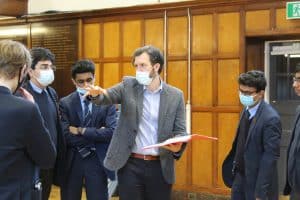 The pupils workshopped a section of the abridged production, with Emma Howell and QE’s resident theatre director, Gavin Malloy, then working with the cast on their positioning, movement and characterisation, in order to help build a dynamic piece.
The pupils workshopped a section of the abridged production, with Emma Howell and QE’s resident theatre director, Gavin Malloy, then working with the cast on their positioning, movement and characterisation, in order to help build a dynamic piece.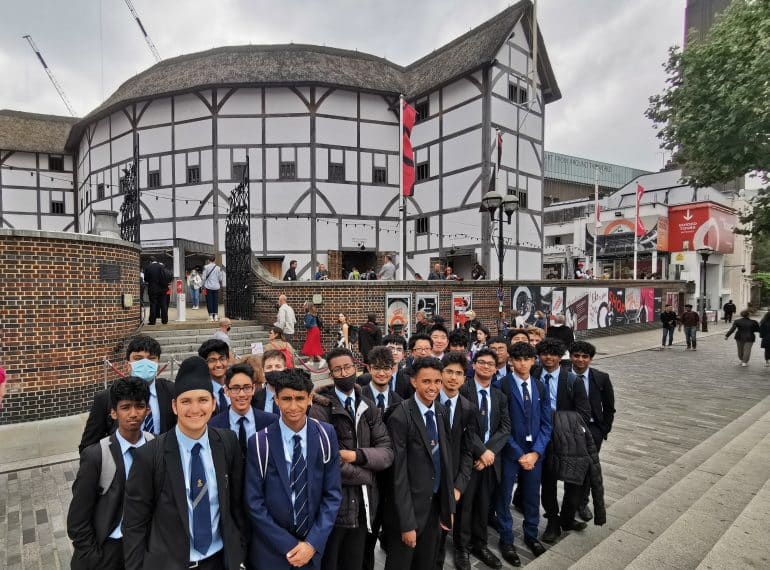
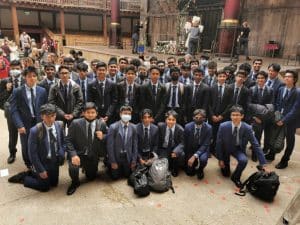 During the visit – QE’s first live theatre visit since before the pandemic – all of Year 11 experienced a radical take on Shakespeare’s tragic tale of two young Italian ‘star-crossed lovers’ that eschewed romance in favour of an unsparing focus on mental health.
During the visit – QE’s first live theatre visit since before the pandemic – all of Year 11 experienced a radical take on Shakespeare’s tragic tale of two young Italian ‘star-crossed lovers’ that eschewed romance in favour of an unsparing focus on mental health. Throughout the play, the boys stood in the theatre yard, or pit – the area which in Elizabethan times was the cheapest part of the theatre, with no seats provided. “This meant that sometimes the actors were moving between groups of students as they performed,” said Mr King.
Throughout the play, the boys stood in the theatre yard, or pit – the area which in Elizabethan times was the cheapest part of the theatre, with no seats provided. “This meant that sometimes the actors were moving between groups of students as they performed,” said Mr King. For his part, TimeOut’s Andrzej Lukowski’s said: “…I thought the billboard was an interesting idea in a mercurial show that often manages to be frustratingly dysfunctional and giddily fun at the exact same time….Essentially Ince’s desire to offer up two hours of hard-hitting social realism and two hours of wild escapist fantasy at the same time is not entirely reconcilable. Kitchen sink regietheatre* isn’t really a thing. But just because it doesn’t always ‘work’ doesn’t mean it’s not good: I loved the wild, irreverent roar of the ball [the scene in which Romeo first sees Juliet]; equally, I think Ince is on to something in choosing to earnestly highlight the number of references to suicide in the play – it seems quite reasonable to interpret the star-cross’d lovers as being depressed.”
For his part, TimeOut’s Andrzej Lukowski’s said: “…I thought the billboard was an interesting idea in a mercurial show that often manages to be frustratingly dysfunctional and giddily fun at the exact same time….Essentially Ince’s desire to offer up two hours of hard-hitting social realism and two hours of wild escapist fantasy at the same time is not entirely reconcilable. Kitchen sink regietheatre* isn’t really a thing. But just because it doesn’t always ‘work’ doesn’t mean it’s not good: I loved the wild, irreverent roar of the ball [the scene in which Romeo first sees Juliet]; equally, I think Ince is on to something in choosing to earnestly highlight the number of references to suicide in the play – it seems quite reasonable to interpret the star-cross’d lovers as being depressed.”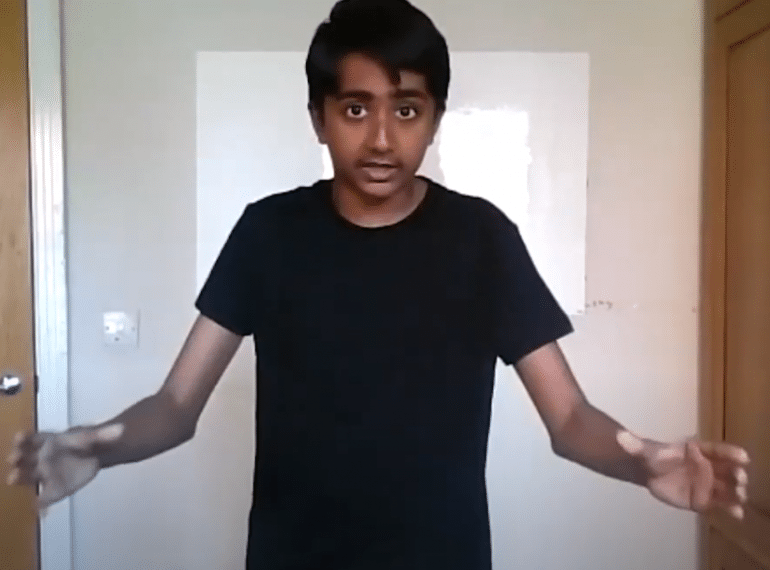
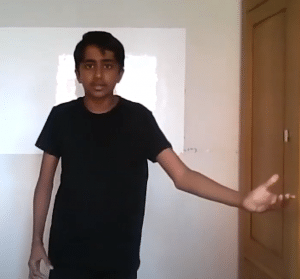 Head of English Robert Hyland said: “His joint-victory is fully deserved, and a credit to all the hard work he has put in. Adithya is in my English class, so when I saw his preliminary performance, I knew we were looking at something good; in the preliminary round in December, he was the only student to score full marks – and that in a top-set English class. However, I don’t think we recognised then how good his performance was!
Head of English Robert Hyland said: “His joint-victory is fully deserved, and a credit to all the hard work he has put in. Adithya is in my English class, so when I saw his preliminary performance, I knew we were looking at something good; in the preliminary round in December, he was the only student to score full marks – and that in a top-set English class. However, I don’t think we recognised then how good his performance was!